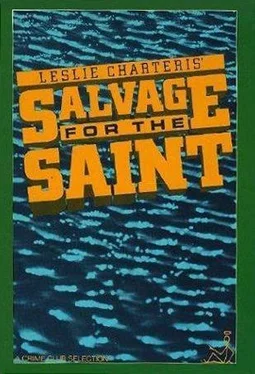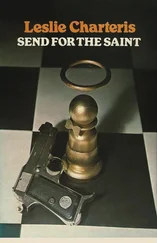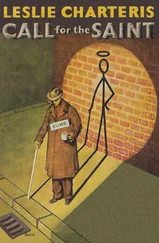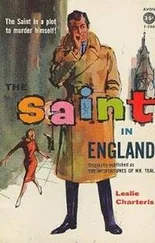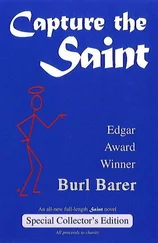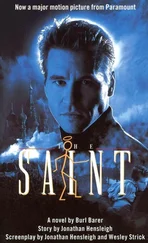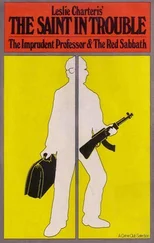“Jal Du hesch rdcht!” he snarled, holding the pistol pointed rigidly. “Meine Frau muss ich glekhfalls umbringen. Aber jetzt, Templar, itz Idngts mit dr Imischig. Itz lani di abe, du Soueheib!”
Simon Templar did not understand every word Tatenor had said in that peculiar honkingly guttural accent; but the sense was as clear as day, and more urgent. And now, as Schwarzkopf’s finger tightened visibly on the trigger of the Very pistol, Simon knew that evasive action was his only slim hope of escaping the spectacular fate of Lebec.
The timing had to be perfect, and the flare not too low; and all the Saint could do was to concentrate his profound and undeviating attention on the former, watching that trigger-knuckle as it whitened, for the fraction of a second during which it moved. He judged the distance, and then...
To say that he ducked would be absurdly inadequate. He dropped. Or perhaps he half-dropped and half-dived down on to the companionway; and the flare swooshed over his head and out to sea.
And then he felt an urgent tug at his ankle; and he looked down and saw Arabella, holding the crewman’s automatic out to him in mute and terrible decision.
He dropped vertically the remaining few feet down the side of the companionway. Their eyes met briefly in silence, and he took the gun. They could hear the sounds of reloading in the wheelhouse, and a second or two later Schwarzkopf reappeared in the doorway.
And before he could fire the signal-pistol for the third time, Simon Templar shot him through the heart.
“And then,” said the Saint the next morning, “there was a nice touch of detail, a little bit of special care on his part, that had me fooled and sniffing off on the wrong scent. You remember I said I’d made some enquiries at the station? Well, the sharp-eyed little stationmaster said the stranger who’d travelled without bags had a French accent. I was already thinking of Tranchier, and that about clinched it in my mind. But Charles — Karl — was so smart he’d anticipated the possibility that someone might be suspicious about the boat crash, and nosey enough to make enquiries — and he prepared the ground so that, if anyone was suspected of having survived it, that someone would be Tranchier. He was certainly thorough, your Charles.”
Arabella turned over on her towel and looked around at the gold that still lay stacked on the deck of the Phoenix.
“Thorough enough to have killed me too.” She turned to face Simon: “It’s lucky I heard him say so — lucky I could understand enough German for that. Otherwise I could never have given you the gun — you know that?”
“Yes,” said the Saint. “I know. And you know now that I wasn’t the sixth man. Lebec was. All those years in the police, he must have been waiting, and wondering if he’d ever hear of that gold. He must have known about Descartes and the others, of course. He’d probably been watching them since they first arrived in the village. And then we turned up, and led him straight to the hoard — and to his old accomplice Karl.”
“And it was Charles — Karl — who tried to kill you in the night club, and who drove the van. And later, he must have been hiding on the Phoenix all the time.”
Simon nodded.
“Except when Lebec and I searched the ship.”
“And where was he then?”
“He could have been underwater, lurking on the blind side of the launch. But my guess is that he headed for the shore at the nearest point. It was only about a hundred yards from where we were, and there are some big rocks there. He’d have kept behind them out of sight until it was time to move. He could probably hear what I shouted to Lebec from the water, or anyway enough of it to know when I was getting near the end of the job.”
Arabella pondered for a while longer. Then she said:
“What about all this gold, Simon?”
“We’re returning it to the authorities, of course,” he said virtuously. “And claiming the reward.”
The coastguard cutter was keeping level with the Phoenix, about fifty yards off the starboard beam, escorting them watchfully back to Marseille.
“And how about the coastguard — won’t he make a fuss about being slugged?”
Simon stretched lazily in the sun.
“I squared it with him. I apologised handsomely — and sincerely. I explained that Lebec was a rotten egg. The crewman’ll get a tenth of our ten percent — I mean a fifth of my five percent.”
“And if the Marseilles police aren’t satisfied about Lebec’s death?” she persisted.
“They will be — once they dig into his past in Morocco and find the connections with the bullion job.”
Arabella pondered a while longer.
“And Finnegan? He was always just what he seemed, then?” she said finally.
“Innocent as a tipsy lamb,” Simon agreed. “And he’s back in top form.” He indicated the ship’s wake stretching away to the southeast behind them in a series of broad zigzags. “However, if I were you, I’d think twice about keeping him on as captain.”
Something else occurred to Arabella.
“Simon,” she said slowly, as she traced the line of his tanned shoulder with a finger. “It looks as though you’re not going to be left with so much out of all this. Four percent. Isn’t that an awfully small commission — for the Saint?”
He grinned, and ruffled her hair where the sun glinted on the red and gold of it.
“Well, to tell you the truth,” he said. “I did manage to keep a bit of the gold back. Forty-one bars, to be precise. Somehow I just forgot to send them up.”
Arabella gazed at him in wonder, and then she threw back her head and chuckled with abandoned delight.
“So you’ve left half a million dollars down there!.. But wait a minute. We pulled up part of the boat, remember? The whole thing may have been moved, dragged along the sea bed. Will you be able to find it again?”
“I think so,” said the Saint. “At any rate, I’m going to have a lot of fun trying.”
“We certainly are,” said Arabella.
